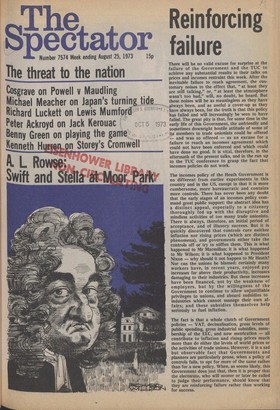There will be no valid excuse for surprise at the
failure of the Government and the TUC to achieve any substantial results in their talks on prices and incomes restraint this week. After the inevitable failure to reach agreement, the customary noises to the effect that, "at least they are still talking," or, "at least the atmosphere wasn't too bad," will, no doubt, be heard. But these noises will be as meaningless as they have always been, and as useful a cover-up as they have always been, for the truth is that this policy has failed and will increasingly be-seen to have failed. The great pity is that, for some time in the early life of this Government, the unfriendly and sometimes downright hostile attitude of some of its members to trade unionists could be offered — and was so offered — as an excuse for a failure to reach an incomes agreement which could not have been enforced and which could have done no good. It is vital, therefore, in the aftermath of the present talks, and in the run up to the TUC conference to grasp the fact that incomes policies do not work.
The incomes policy of the Heath Government is no different from earlier experiments in this country and in the US, except in that it is more cumbersome, more bureaucratic and contains more controls. There has never been any doubt that the early stages of an incomes policy command great public support: the abstract idea has a distinct appeal, especially to a citizenry thoroughly fed up with the disruptive and mindless activities of too many trade unionists. There is always, therefore, an initial period of acceptance, and of illusory success. But it is quickly discovered that controls cure neither inflation nor rising prices (which are distinct phenomena), and governments either take the controls off or try to stiffen them. This is what happened to Mr Macmillan; it is what happened to Mr Wilson; it is what happened to President Nixon — why should it not happen to Mr Heath? Nor can the unions be blamed: certainly many workers have, in recent years, enjoyed pay increases far above their productivity, increases damaging to their industries. But these increases have been financed, not by the weakness of employers, but by the willingness of the Government to continue to allow unjustifiable privileges to unions, and absurd sudsidies to industries which cannot manage their own affairs; and these subsidies themselves help seriously to fuel inflation.
The fact is that a whole clutch of Government policies — VAT, decimalisation, gross levels of public spending, gross industrial subsidies, membership of the EEC, and now metrication — all contribute to inflation and rising prices much more than do either the levels of world prices or the activities of trade unions. However, it is a sad but observable fact that Governments and planners are particularly prone, when a policy of controls fails, to opt for more of the same rather than for a new policy. When, as seems likely, this Government does just that, then it is proper that the electorate, who will sooner or later be called to judge their performance, should know that they are reinforcing failure rather than working for success.


































